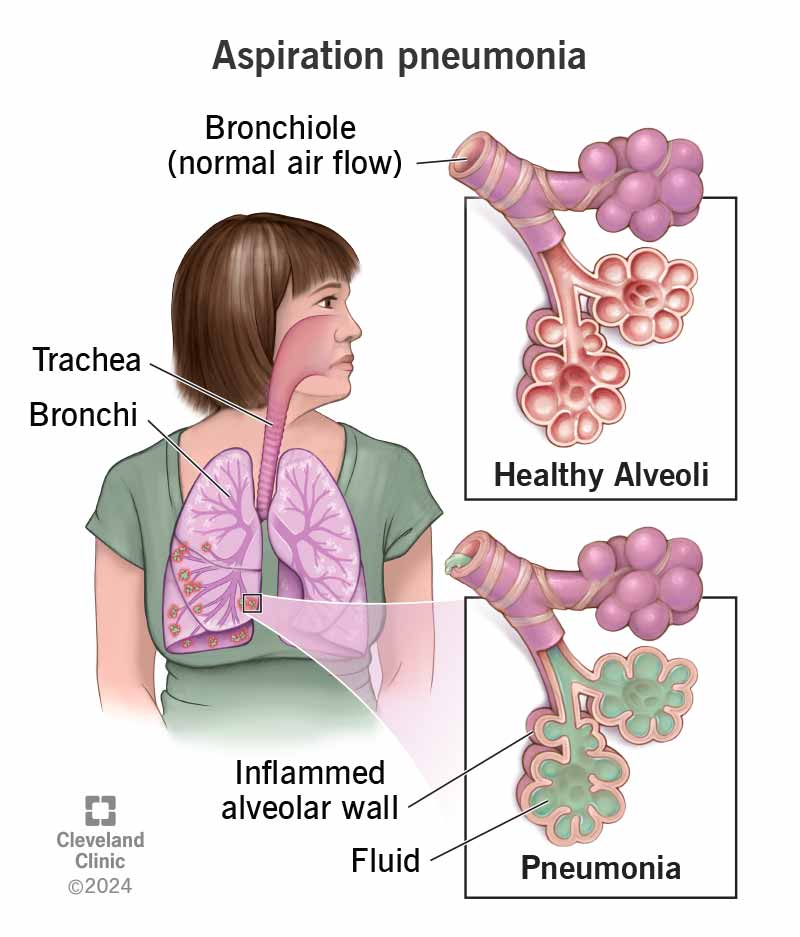Aspiration pneumonia is an infection caused by inhaling something other than air into your lungs. This could be food, liquid, saliva or stomach contents. Many people don’t know they’ve aspirated something. Symptoms include fever, shortness of breath, coughing up blood or pus, chest pain and tiredness. Providers treat it with antibiotics.
Advertisement
Cleveland Clinic is a non-profit academic medical center. Advertising on our site helps support our mission. We do not endorse non-Cleveland Clinic products or services. Policy

Image content: This image is available to view online.
View image online (https://my.clevelandclinic.org/-/scassets/images/org/health/articles/aspiration-pneumonia)
Aspiration pneumonia is a bacterial infection in your lungs. It can happen when you aspirate, or inhale, something other than air into your respiratory tract. This can be food, liquid, saliva, stomach acid, vomit or even a small foreign object.
Advertisement
Cleveland Clinic is a non-profit academic medical center. Advertising on our site helps support our mission. We do not endorse non-Cleveland Clinic products or services. Policy
You’ve probably had something “go down the wrong pipe” — meaning that food or liquid went down your windpipe (toward your lungs) instead of your esophagus (toward your stomach). When this happens, your body reacts and you cough it out. But for some people, they’re unable to get it out, and something ends up in their lungs that doesn’t belong there. This can cause bacteria to grow, causing an infection (pneumonia).
Many people with aspiration pneumonia don’t realize this has happened — called silent aspiration. The infection can develop days or even weeks after aspirating.
Symptoms of aspiration pneumonia include:
It may take days or weeks for symptoms of pneumonia to develop after you aspirate something. Remember that people with aspiration pneumonia often don’t realize that they aspirated anything.
Inhaling something into your lungs that shouldn’t be there can lead to aspiration pneumonia — especially if you’re unable to cough it out (or you don’t notice). Anything that’s not air can bring bacteria with it, which causes the infection.
Things that can get into your lungs that can cause pneumonia include:
Advertisement
You’re at a higher risk for aspiration pneumonia if you:
Aspiration pneumonia can lead to sepsis — a life-threatening reaction to an infection — and respiratory failure.
To diagnose aspiration pneumonia, your provider will ask you about your symptoms and your medical history. They may ask about any conditions that affect your ability to swallow or cough. Tests that can help providers diagnose aspiration pneumonia include:
Providers usually treat aspiration pneumonia with antibiotics. Depending on how severe your symptoms are, you might also need oxygen therapy or mechanical ventilation while the antibiotics work.
If you have an ongoing condition that increases your risk for aspiration, you might need treatment for the underlying cause. Depending on the cause, treatments could include:
It might take you a week or so after starting antibiotics to start to feel better. Many people are still tired up to a month into recovery.
If you have an underlying medical condition that causes frequent aspiration, you’ll need to work closely with a healthcare provider to manage it.
Most people survive aspiration pneumonia. Mortality (death rate) depends on the severity of the disease and other health conditions (comorbidities).
If you often feel like you’re choking or you have difficulty swallowing, see your provider. You may need to see a specialist who can help diagnose and treat underlying conditions.
Call 911 or your local emergency services number or go to the emergency room if you have symptoms like chest pain, fever and difficulty breathing. Pneumonia can get worse quickly.
Advertisement
It might be helpful to ask your provider:
To reduce your risk of aspiration (which can lead to pneumonia), you can:
Aspiration pneumonia is sometimes confused with aspiration pneumonitis. An infection causes aspiration pneumonia. Aspiration pneumonitis is inflammation in your lungs without an infection.
The feeling of something going down the wrong way is something we all can relate to. But when that “something” breeds bacteria and turns into aspiration pneumonia, it can become a serious situation.
If you have a condition that makes aspiration more likely, it’s especially important to be on the lookout for symptoms of pneumonia. Talk to your provider about any concerns you have or if you need help managing your condition.
Advertisement
Learn more about the Health Library and our editorial process.
Cleveland Clinic's health articles are based on evidence-backed information and review by medical professionals to ensure accuracy, reliability, and up-to-date clinical standards.
Cleveland Clinic's health articles are based on evidence-backed information and review by medical professionals to ensure accuracy, reliability, and up-to-date clinical standards.
Need care fast? Cleveland Clinic’s Express Care and Urgent Care locations treat everything from sprains to sinus infections — no appointment needed.
